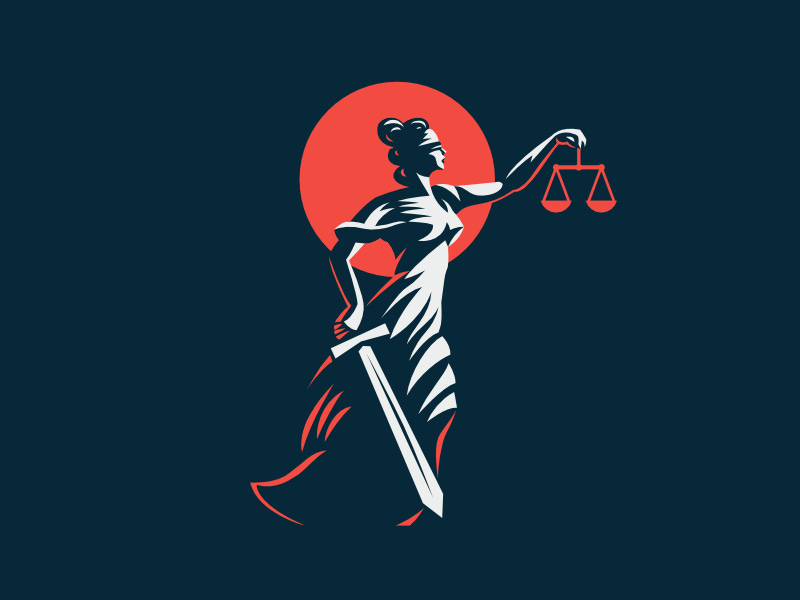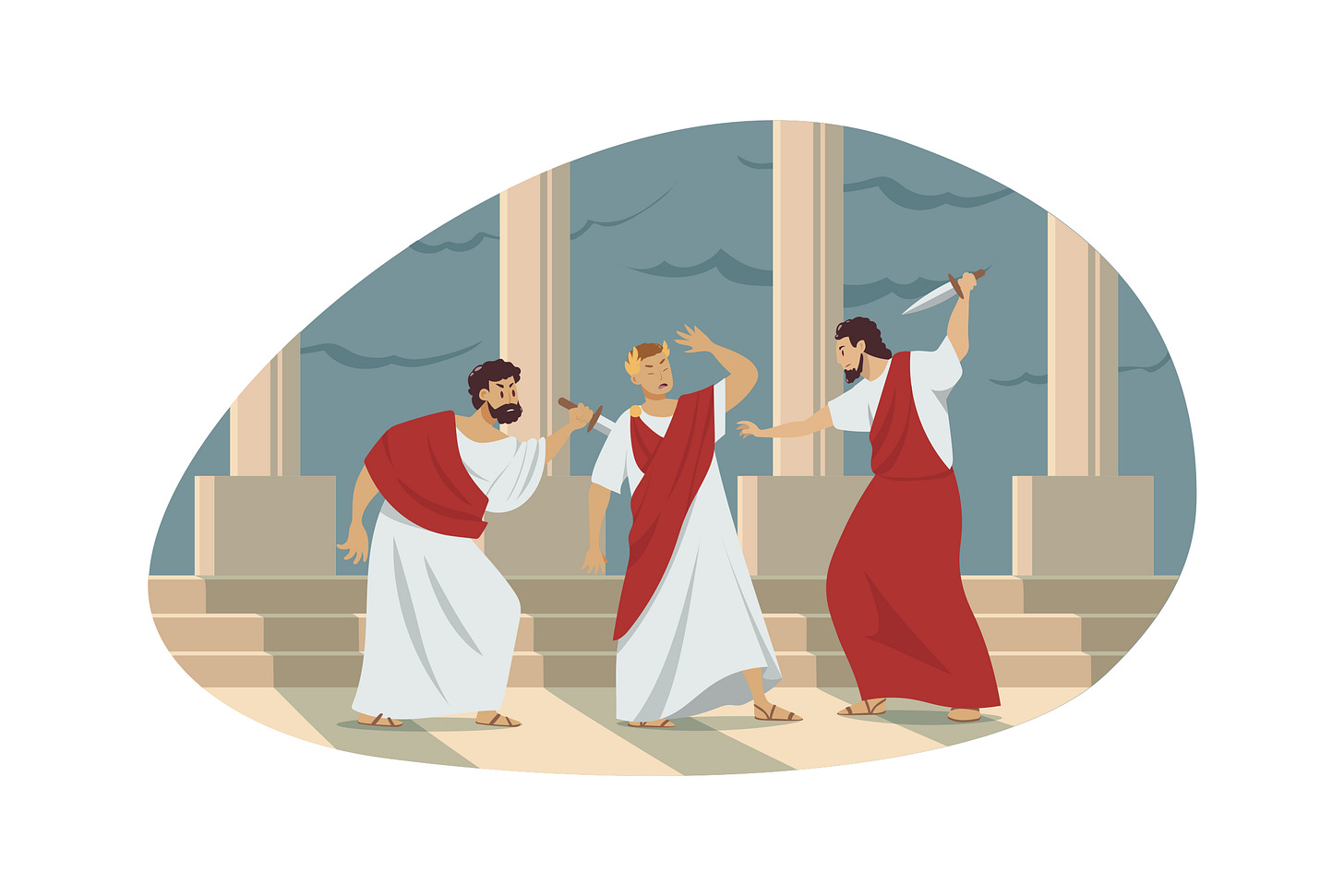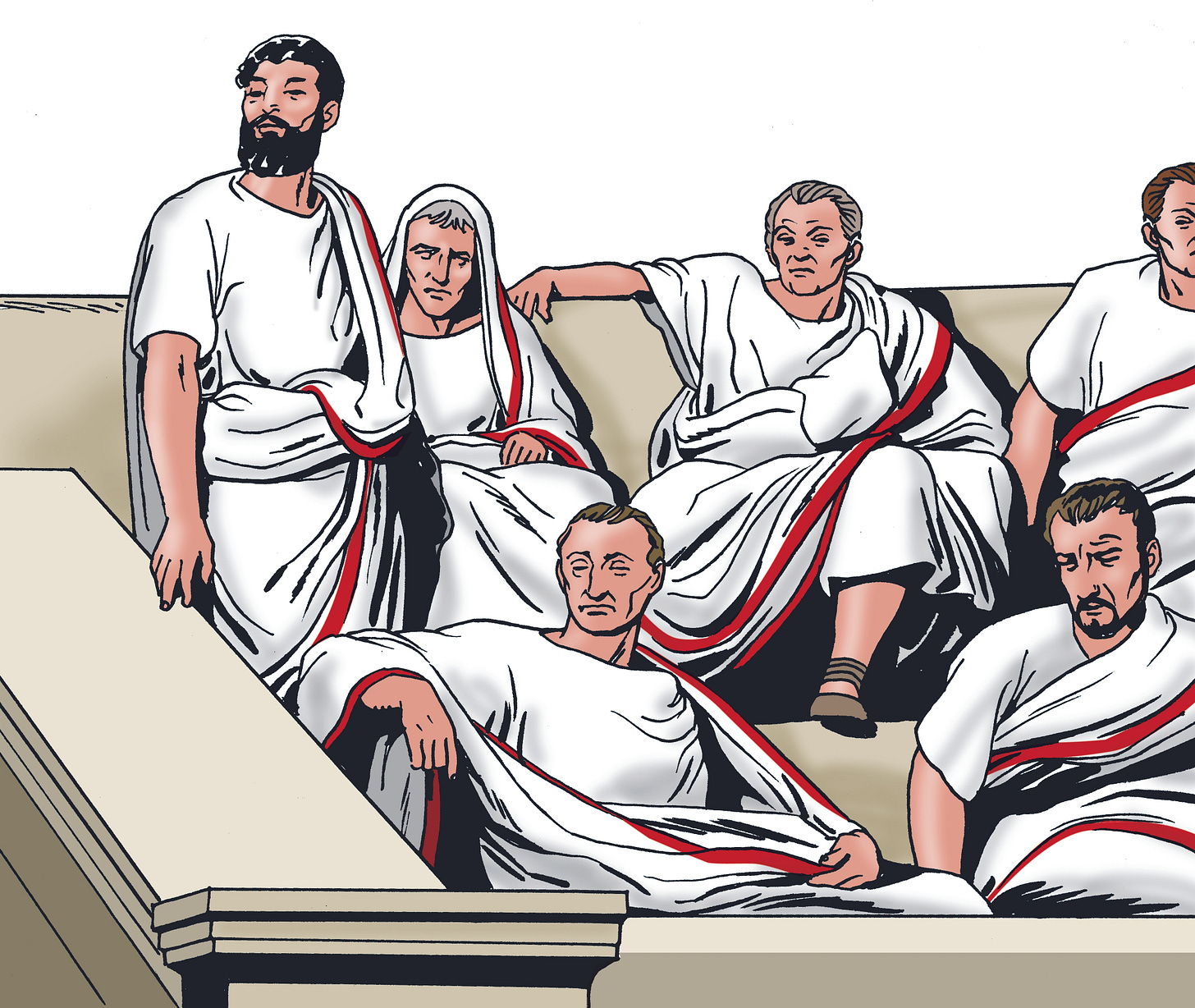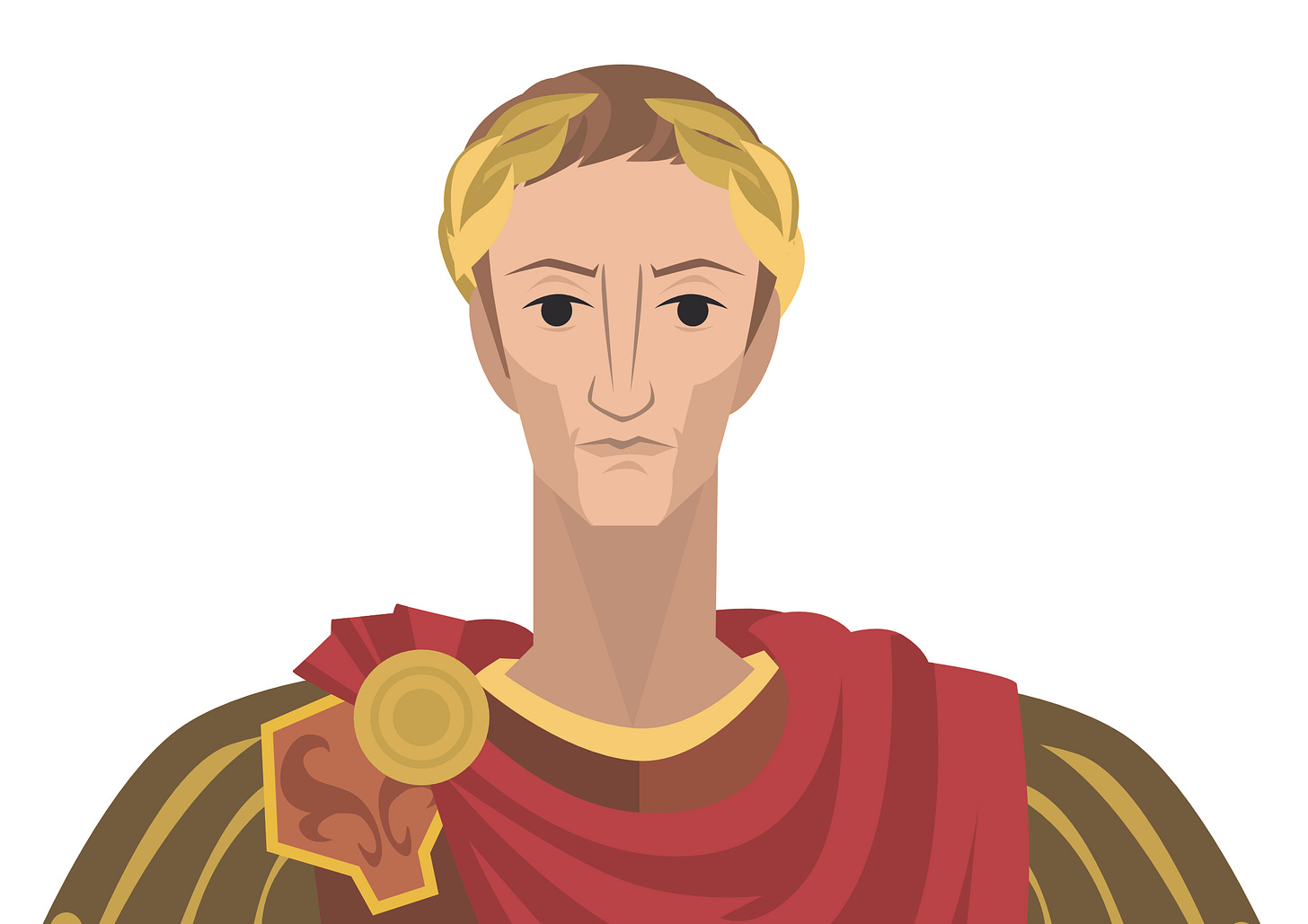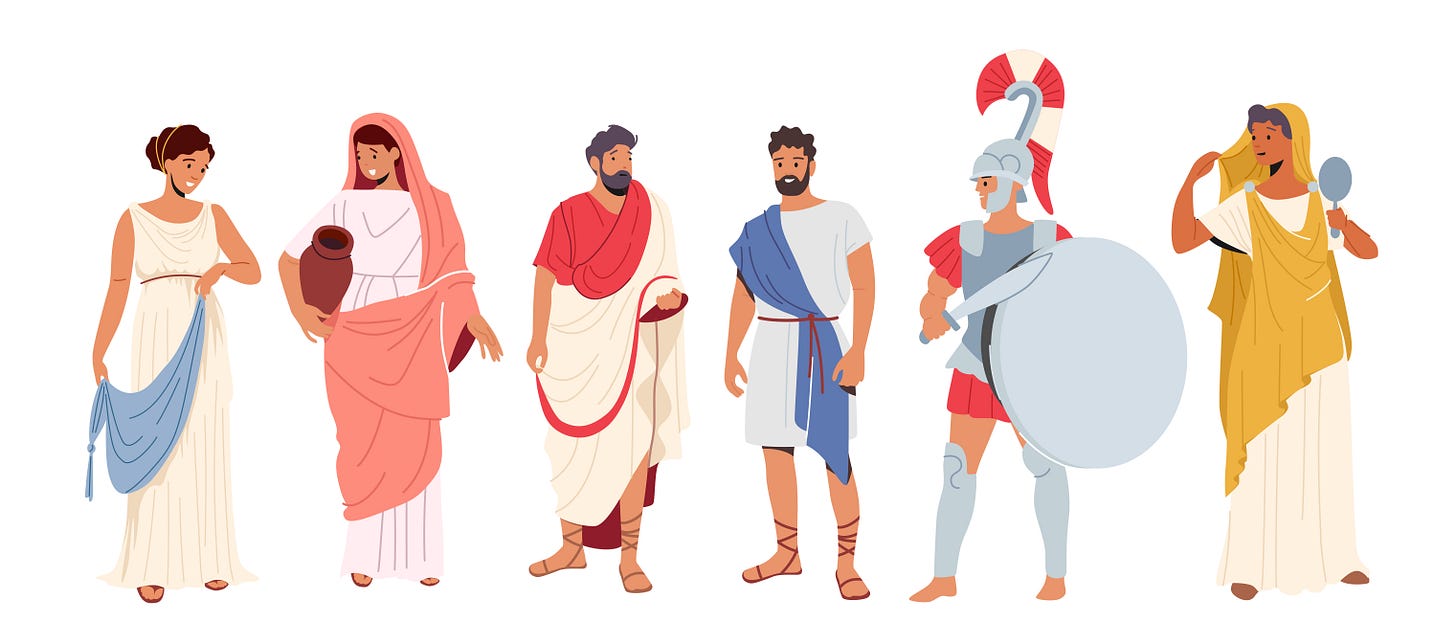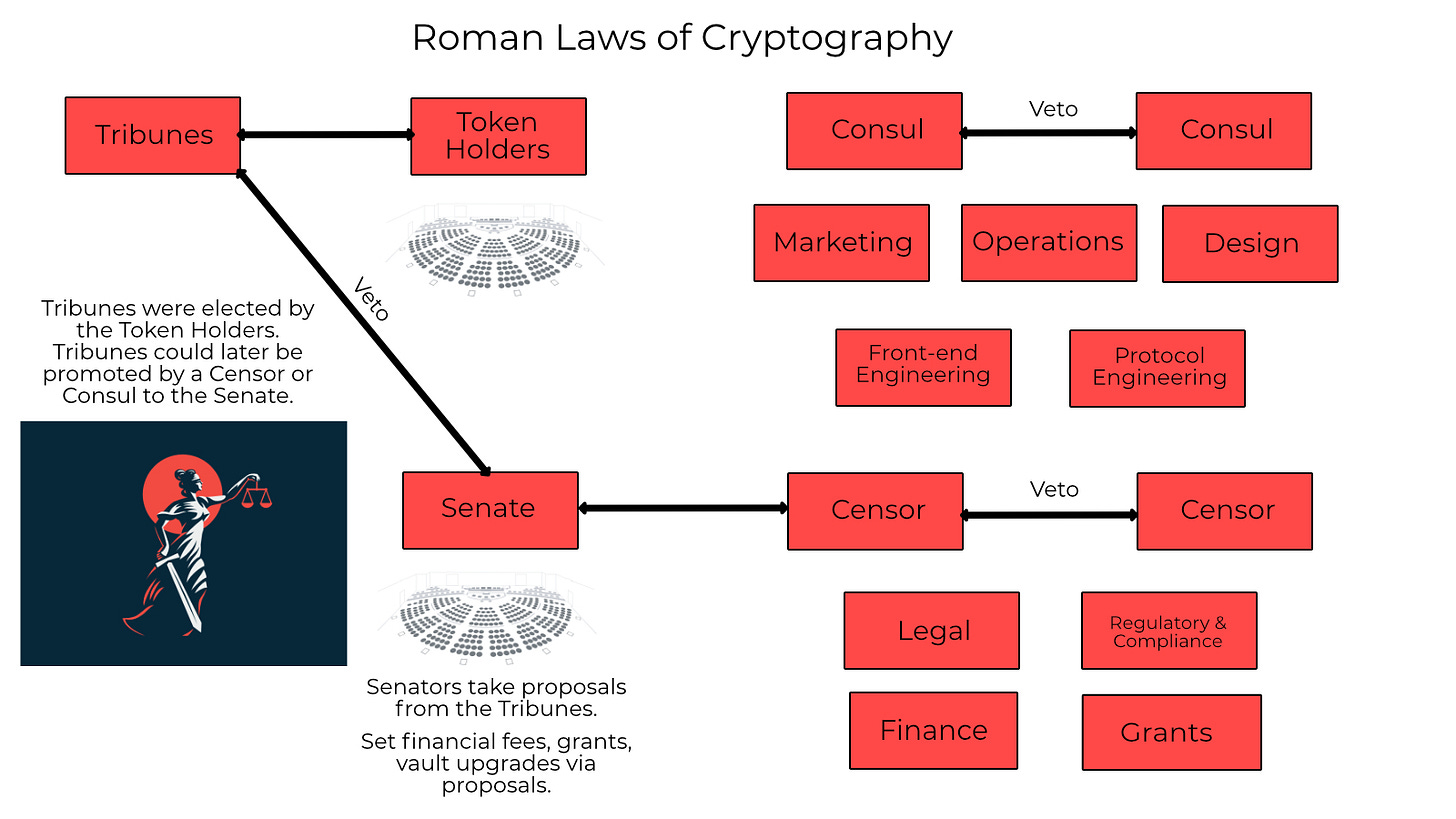I’m really into Roman History again, as it applies to crypto of course. I’ve been listening to the entire History of Rome podcast by Mike Duncan and it’s inspired the shit out of me in regards to the logistics of crypto DAOs.
Although obvious as a potential system of protocol governance (it’s the Romans for bloody sake!), it doesn’t appear that anyone has taken a stab1 at it.
This article will take a mostly serious look at how we should take inspiration from the Consul system of the Roman Republic. This system of governance during the Roman Republic was in a constant state of change as they faced threats from their much stronger neighbors (cough cough TradFi), and were forced to integrate an immensely large amount of people from different backgrounds, and cultures (cough cough Crypto). It didn’t always work, but the main takeaway is that this was a very similar situation to what crypto governance faces today; albeit 2500+ years later.
With Tribunes, Consuls, and Censors - it might come with challenges as we attempt to widen the lens we use to get from here to there in our brains. There were many bureaucratic roles beneath the larger org structures, but due to scope creep I will focus mostly on the above mentioned trio.
Most governance ideals in the Roman Republic were in response to the threat of monarchy; with the unique duopoly structure threatening to break my brain just in the introduction of this article. Romans you see - especially during the Republic period were very keen on the veto system, it was viewed as a check on the power of anyone who might desire themselves king. Even then there were times (usually war) where the Romans would vote a man Dictator2 for six months, or longer. Furthermore in this article I will attempt to draw parallels between the Roman Republic system of governance and present day crypto governance.
The other ‘G’ word
I’m still looking around, but it seems like one of the biggest hurdles with governance structures is that we all think of it as NOT ‘government’, but the definition is:
Governance - Government; exercise of authority; direction; control; management. (Wordnik)
Now, this is the 2nd definition, but I think we can all agree that no one wants to really talk about ‘governments’, and everyone wants to opine about ‘governance’.
Let’s add a bit more depth to the argument I’m trying to make.
In 2008 Neal Stephenson wrote a book of speculative fiction3 called ‘Anathem’. The reason he wrote it in the style of speculative fiction is that he didn’t want to get bogged down with all the monoculture, and pre-existing opinions that engage our biases and prevent real learning, or discussion from being accomplished. Thus I have chosen the Roman theme to allow us to leave our current left/right cesspool and see how the Romans dealt with the issues of governance in the formation of their very successful Republic.
This article is also for anyone who’s had to read through large chapters on DAOs, Quadratic Voting, governance apathy articles and anything from King DAO himself - Ryan Selkis.
Messari has bet big on DAO’s with it’s ‘Messari Governor’ launch and Ryan Selkis has an entire chapter on DAOs in his latest Crypto Theses(2022).
And well, you can’t really skim by any protocol without stories of voter apathy, complaints of whale abuse, and even the general hell that is getting parties to sign the damn multi-sig!
This article is specifically geared to deal with two specific issues in regards to governance and how I believe the Romans have already had to deal with this; specifically in the Roman Republic period from 509 BC to 27 BC.
I’m making a promise that by the end of reading this you will find actionable information from this diplomatic quagmire, between the Developers (Patricians), and the Token Holders (Plebs). They really did have to figure it all out on the fly and at huge risks and costs; again it sounds very, very familiar right?
Firstly, there is the issue of the early governance challenges the Romans faced when growing rapidly, and transitioning from a Monarchist system to a Republic. You can basically replace Monarchy with Centralized, and Republic with Decentralized. I will make similar substitutions during this piece.
Secondly, the Romans had an issue where most legal disputes were originally settled via tradition and convention. This left many persons abused by the system as there was no written proof, and the goal posts could always be moved the next day.
I find this very similar to the complete lack of crypto laws and norms that we can all agree upon at this point in crypto culture. Also, how many unwritten rules and conventions do we abide by, but yet have no means to enforce. People from all over the world are imbued with the views of their culture, and their monetary challenges within the financial systems they are forced to navigate; we need to get on the same page.
My biggest personal gripe with all governance whether in crypto, or in traditional government is that you can either copy the laws from someone else (traditional lobbying), or write your own laws. Since I don’t believe most people reading this want the TradFi laws again, then might I suggest we do as the Romans do.
The real world requires real solutions that take us not just to the imagined ends, but the complete journey bridging the gap between here and there. Let’s take a straight Roman road shall we? Perhaps we can form a reasonable system of government for protocols.
Do as the Romans do…
The Romans after 7+ kings, some of whom were egotistical tyrants - jumped headlong into a Republic, and as with most governance systems there is a certain product-market fit for any age. Many people to this day still believe that everything happens for a reason in a non-karmatic sense; a never failing line upwards, always for the betterment of humanity.
This is of course false.
Life is actually more like a shitcoin, more likely to burst into flames like a phoenix after flying too close to the sun; burning up all its liquidity in a short lifespan.
The old adage is true - it’s probably been done before, but in this case we will attempt to forge new ground together. Ironically we will do this by going over old ground, but hey it’s crypto and as long as you get to the ends - well you get my drift.
So as I was saying in this impressively long introduction - Roman History, namely the Roman Republic existed as a form of government from 509 BC to 27 BC.
We’re going to focus on the part pre-empire, before they turned into megalomaniac emperors - present day characters excluded of course.
I present to you without ego - The Roman Laws of Cryptography. Some of these are actually the natural laws of crypto attached to the Roman theme, but the mystique is just too damn powerful and I just had to go full Roman.
but I digress.
Now at this point if you’re strictly libertarian - well you might want to close this tab. If you’re somehow a diehard governance fan of CT (why God why?)
Let’s continue.
Introduction to Roman governance concepts across blockchains
Definition: Government - Exercise of authority in a political unit; rule. (Wordnik)
The word republic comes from the Latin term res publica, which literally means "public thing", "public matter", or "public affair" and was used to refer to the state as a whole. The term developed its modern meaning in reference to the constitution of the ancient Roman Republic, lasting from the overthrow of the kings in 509 BC to the establishment of the Empire in 27 BC.
I’ve been reading a lot of Defi 2.0 pieces lately and I just want to make it explicitly clear that in this article I’m attempting to address the problem of ‘general’ governance and not ‘bribery’, ‘layers of complexity’, or ‘advanced compounding staking strategies’. I don’t care why Andre left, I just hope he’s happy and shit-posting.
I’ve read some warnings in regards to macro long-term security for chains like Ethereum; power accumulation via the staking economy (Lido), or Bitcoin with ESG, and future BTC forks in general. Look everyone - all we need is to be organized, and we can’t just leave it all for the Jerry Britos and Ryan Selkii of the world. Mainly because I disagree with Selkis at least 30% of the time, and Brito - well he charges by the hour.
I’ve been trying to find a pre-existing set of laws that would inspire the left and right ideals of crypto society to properly govern a decentralized, permissionless future. The Romans of old cared very much that they would never again be ruled by a king and these sorts of goals parallel very well with current crypto ecosystem concerns.
I might also posit to you that maybe people are sick of presidents, and prime ministers, and don’t want to go full socialist-commie, so let’s take a shot at the dual consul system of the Romans.
A great example of a real case situation would be Jet Protocol($JET).
$JET was started by James Moreau and Wil Barnes. Both of them unwittingly operated in a consul system before upgrading to their current Swiss wrapper DAO organization the Jet Association. Eventually it will be the Jet Association4 handing off to the decentralized DAO, but those days are in the later future. Early on in Jet Protocol, James and Wil had to delegate to whom they affectionately called their ‘generals’ and decide who had a budget and who had the power to hire/fire as needed. They were able to drive forward their vision of the protocol development roadmap, and delegate most management to the leadership(generals).
This in my opinion is an example of a classic Roman consul system. Yes, you could argue that James, or Wil had more, or less power, but the point is that in real companies, whether a consul system, or a board of directors; vetoes are not used haphazardly. James and Wil worked within the system they chose to create when they formed the original LLC. I have been in a corporate relationship where I owned 40% of the company and my senior partner owned 60%. Although originally we thought we would do it 50/50, it actually turned out to be a blessing as we always knew who had final say (aka the veto). Even though I am no longer partners with this person we were able to work through numerous multi-year scenarios when times were tough because the system of command was clear.
Remember the main reason the Romans used the consul system is because they did not want to be ruled by one man, or simply put a king.
This system is very unfamiliar to us in present day, most likely since the system hasn’t been in use for about oh 2000+ years!
We’re going to try and get through this as efficiently as possible, and many aspects such as the Senate, and general governance of the Romans will be quite familiar to anyone that has consumed any Greek culture. The main head roles were Censor, Consul, and Tribune; please keep in mind that I will be attempting to slowly morph these roles into a bit of a crypto governance roleplay. I’m 40+ years old and many of these roles required study, and meditation to visualize the governance dynamics.
Once again I will try to replace the older descriptors with current name monikers such as Token Holder instead of Plebeian, and Developer instead of Patrician.
Quick Overview
After re-reading this piece a few times I feel it is important to introduce the main roles of the Republic and hopefully provide inspiration for crypto founders. Keep in mind that these roles were in place for well over 500 years and worked fairly well in a cutthroat winner-take-all environment. In Rome these people controlled everything in your lifetime - assume the same will be true in crypto.
Consul
Two consuls
Each consul can veto the other consul
One consul is chosen by the Devs (Patricians)
One consul is chosen by the Token Holders (Plebeians)
One year terms.
scipio eberneus43+ years old.If one consul leaves for whatever reason, another is elected.
One consul must always be from the Devs.
One consul must always be from the Token Holder.
Consuls traditionally, when not on separate projects would rotate month to month in command as chief operating officer.
Consuls control administrative(hiring), legislative(proposals and roadmap), and judicial(calling votes, or forks).
Censor
Two censors (Duo just like consuls)
Each censor can veto the other censor, they usually don’t.
One censor is chosen by the Devs (Patricians)
One censor is chosen by the Token Holders (Plebeians)
18 month terms.
If one censor leaves for whatever reason, another is elected.
One censor must always be from the Devs
One censor must always be a Token Holder.
Censors traditionally, when not on separate projects would rotate month to month in command as chief tax officer.
The power of the censor was absolute: no magistrate could oppose his decisions, and only another censor who succeeded him could cancel those decisions. (Wikipedia)
Censors controlled who would be in the Senate, or put in a different way; who could vote for proposals.
Tribunes
Elected by the Token Holders.
Ten tribunes elected each year.
Ability to send proposals to the Senate.
The tribunes didn’t have the same power as consuls, but they could veto any decision if it affected Token Holders. This is an important distinction when attempting to run a modern DAO.
So the original idea is that Roman governance growing pains during the 500+ years of the Republic have a lot to teach us. Even though they happened 2500+ years ago. Feels pretty crypto to me.
Let’s just call it the ‘Roman Rules of Crypto’.
So I am making the assumption that crypto markets will always exist in the digital space and therefore they are going to need clear laws to be codified, but not necessarily by governments.
I have purposely delayed introducing the last position after even this far into the article - this is of course the position of dictator.
Dictator
Elected by a consul.
In rare circumstances elected by the Senate, or popular vote.
Given a specific task to complete - usually to protect the Republic from threat of war, sedition, or any other emergency that requires the removal of red tape and committees.
Although six months was the common accepted term, historical record does not necessarily support this and it seems more likely that dictators would expect to have the appropriate time to complete their objectives if they had not yet failed.
Roman dictators5 have their own little separate section on Wikipedia - not to be confused with…you know the other guys. Many times in Roman history, especially early on; consuls of the year, or the higher ups would make poor choices and lose tens of thousands of men, or even worse have Rome get sacked, or threatened by Hannibal for a more specific example. Dictators were called in for the job when you had to pull someone out of retirement, or get the best general in the realm out of previous obligations. If you pulled it off you could get rewarded with a Triumph.
You could right away see how this has already been used in crypto with mixed results.
Daniele was brought in to try and fix Sushi.
Sushi had to bring in SBF early on after the vampire liquidity attack.
Vitalik has been called in numerous times for help with the Eth merge.
You could argue Barry Silbert was used to help with $ZEC recently.
Kanav Kariya during the Wormhole hack.
You could also argue that CZ and Do Kwon are basically dictators respectively in the Roman sense of both Binance, and Terra respectively.
The point I’m trying to make is that these roles serve as important context for what is and is not possible in any bureaucracy, or governance system. Dictators are merely a position that was used to great effect by the Romans. Sometimes you just need to bring in someone without relationships to the inside and clean house, or in crypto’s case - clean out a DAO, or token team.
Example 1: ‘We need Kanav to figure out a solution for this bridge hack…’ (Jump Crypto)
Example 2: ‘Do Kwon needs to solve the reserve problem and shore things up until the 20% can be sustainable’ ($LUNA)
Token Holders are Plebs
We always joke about how useless HODLERS are. The Plebs, the frogs, the apes, the chimps, the unwashed masses. It can feel like you’re a part of crypto, but not - what rights do you really have? This is how the Plebeians felt in ancient Rome. No representation, no protections, only tradition, and rich patrician judgement.
Later on in Roman Republic history you had the 2nd wave of people, the non-naturalized citizens, the immigrants(Token Holders) - these people are called the Plebeians. You know those annoying plebs, always wanting their piece of the pie!
For clarity I’m going to refer to the traditional roles as Developers(Patricians) and Token Holders(Plebeians) instead of their historical names. From now on I’m going to imagine a world where crypto governance is in the guise of a Roman situation. Purely for interpretive gains. I’m going to now imagine a Roman governance system operating in the guise of a DeFi protocol. I’ve leaned heavily on the current Jet Protocol ideas of governance as they were the easiest available resource to compare to. The Jet team believes in governance very strongly and I’ve attempted to integrate their ideas with the Roman Rules of governance. Also it seems that unintentionally James and Wil of $JET have been working as a consul system.
I will refer sometimes directly to Jet Protocol’s organization as a specific crypto example. Please bear with me as I attempt to use Roman history as an actionable example of crypto future governance.
The early Roman Republic faced an early challenge when Token Holders and Developers couldn’t cut a deal because Token Holders wanted a say in the day-to-day operations of the Republic/Protocol. You see early on there were no codified rules - everything was just argued away via conventions, or local custom. Token Holders realized pretty quickly that it really sucked if you had no say in governance, even if it was boring, and somewhat tedious. This can lead to extreme voter apathy, but could you blame people for feeling powerless like the Plebs? Token Holders in Rome knew that they would never be allowed into the DAO of Roman times (i.e. Roman Citizenship) and this really, really pissed them off. Imagine being a long-term, large token holder in a crypto protocol, but never being allowed to have a direct say. This was the situation for thousands of Token Holders (Plebs) and they had to eat the most shit when the protocol made huge decisions without their consent.
The current $USDN fiasco comes to mind. Also $MIM, $SPELL, Worldcoin, the list goes on and on.
Also the law tended to favor those who wrote the laws.
Thus good governance was required to relieve the serious chasm between the Token Holders and the Developers. In the end the Devs didn’t want to share anything with the Token Holders, but if everyone just sold their tokens en masse the protocol would be doomed.
It was much easier to just get the Token Holders to choose a few of the more respected Token Holders to carry forth their needs and desires to the Senate.6
This was already happening anyways, just not in any official capacity.
They did this via the newly created position of tribunes.
Tribunes could only suggest proposals, but had the one unique power of being able to veto anything that affected Token Holders. Kind of like a tokenomics veto.
Translation: Veto - ‘I forbid’.
After the Token Holders threatened to sell off everything due to poor terms, the Developers came up with a new governance plan, Token Holders in a special council(no powers, except proposals), but one specific power - the Veto via their elected Tribunes.
To recap if Romans were crypto users:
Consuls (2x elected individuals from the Senate, Dev x1, Token Holder x1)
Developers (VPs, Barry Silbert, SBF, protocol founders, large seed round hodlers)
Token Holders (No Power except via their elected Tribunes, and proposals put to the Senate)
Censors (The ones who control membership in the Senate, also controlling the treasury and collecting data on the users via the Census)
Tribunes (power in the sense that they can veto what affects the Token Holders, e.g. changes in Tokenomics)
Dictators (we’ll deal with them later)
Little bit more on the Census -
It might come as a shock, but the most important job of the censor was to complete a census.
Now this might sound like a simple task at first, but it is a massive pain in the ass. People just don’t like being counted, categorized, or to be forced to clarify their official net worth. Nonetheless, it is of extreme importance to pay attention to exactly who your citizens are, and secondly; what do they want? There is that video on YouTube of the real Wolf of Wall Street guy7 talking about questioning potential clients and figuring out what they want. The reason you do this is to be able to sell them what they just asked for. In Crypto’s Rome you need to know via products like Nansen8 , Dune Analytics9 , and many others what is moving the needle, and where the needle needs to move to. In Crypto we have lots of data available, but we need to use it.
A Crypto Civil Service?
In fact most of the later years in Rome after the fall of the Republic there were emperors like Augustus and Claudius improving/inventing a better functioning government.10 They found that they needed other layers below the senators, and people’s assemblies. This could be a direct comparison to current crypto founders and DAOs. You need community managers, and marketing people, help desks and research teams.
The Romans needed permanent civil servants that served regardless of allegiance and/or consul relations. It was chaos every time there were new rulers as this caused many purges. You couldn’t murder and exile people just because they supported the previous regime, or at least not all the time. It takes time to develop people that are able to allow larger scale organizations to operate without getting bogged down in corruption and overwrought bureaucracy.
The Roman state had to grow up and stop depending on new domains to conquer, but to really function regardless of who the consuls, censors, and tribunes were at the moment.
Rome really did try to live the libertarian dream, it just wasn’t possible, and never will be.
You always ended up with a tyrant, or a king, just like the Emperors just ended up being the new kings under a different name.
The point being that in all forms of business organization you end up with the decentralized/centralized flywheel effect. Meaning that if you get too large you must decentralize, but if you are too small and spread out you must centralize.
The only way out of this ponzi situation is to have the middle layers of civil service:
the community managers
the help desks
the researchers
the educators
the tech support
Let’s back it up and try closing this with more context…
Romans, you know the guys that controlled most of the world for 1000+ years - well they faced a similar dilemma as crypto upon their birth as a Republic. They needed to figure out their governance model, and fast.
Now remember they didn’t really know anything except what the Greeks did at this point. The founding story of Rome is based on the principle that survivors of Troy (yes, that Troy), escaped after that whole Achilles thing and founded Rome. Early on the Romans copied two major Greek inventions - the Phalanx, and the Senate.
The disappointing truth is that the foundation the Republic needed to survive wasn’t invented until the Republic had already died. It was impossible to keep ambitious men from destroying it all in one generation when you needed equally ambition men to do all the administration.
I know I’m a little bit on a tangent here, but a censor was responsible for knowing where everything was, and how much it was worth, but also in appointing the people who would be the future senators. They normally would be appointed from the small pool of people who had founding and developer experience.
The tribunes allowed the Token Holders to be involved in the governance of the protocol (i.e. Rome) with regards to their veto over actions in the senate, yet no really day-to-day power.
Finally, the consuls run the protocol, but have the support of each other, and the knowledge that at least one other person must support their decisions.
In times of deadlock the citizens of crypto could call on dictators, albeit not the kind we’re used to reading about, but single individuals given specific goals in response to serious challenges faced by the protocol. Think government interference, organized crime influence, or a solar flare knocking out most of your nodes and/or validators.
In a DAO, or corporation involved in crypto you might want to consider the consul system. It’s whole purpose was to prevent all the power of being in one man’s hands - aka a Danny, Andre, or Sifu, or any one person who might wreak havoc on thousands of people’s investments. We have no SEC, or abbreviated organizations to depend on - - we just have whoever we have…right now.
Think of a future DAO system where roles are handed out in this Roman fashion.
Many complaints about DAOs are that they become paralyzed by committee, burdened by a bloated membership and unable to act quickly, and decisively; especially during important market events such as crashes, price fluctuation, and global disasters (war, famine, shortages).
I’ve sorted it out in my brain as follows.
Leaders: Consuls, Censors, Tribunes, and Dictators in emergencies.
Representation: Senators, Tribunes.
Civil Service: Legal, Marketing, Grants, Engineering and so on…
Token Holders
I’ve definitely got to sort a bit more of this out to make it more digestible, but anyone reading this right now - thank you. I’m very interested to see if this could ever work as any form of government in crypto, at the very least I hope it inspires someone to improve the current governance system in crypto.
I have a part 2 almost complete with natural laws of crypto. Please feel free to reach out, or DM me anytime.
Bob
‘Et Tu Brute’
Yes, this is the origin of dictator. Oh! Those Romans.
Speculative fiction is a broad category of fiction encompassing genres with elements that do not exist in reality, recorded history, nature, or the present universe.
https://www.jetassociation.org/
https://en.wikipedia.org/wiki/Roman_dictator
Yes, I’m aware of the different governing bodies and I’m not going into them for the purposes of simplicity.
‘Sell me this pen’
https://www.nansen.ai/
https://dune.xyz/browse/dashboards
This is somewhat ironic considering they were emperors.




